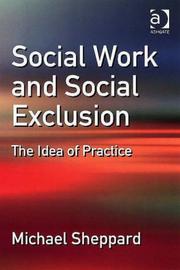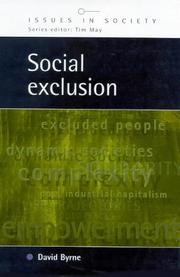| Listing 1 - 10 of 18 | << page >> |
Sort by
|
Book
ISBN: 9780415475846 0415475848 0415475856 9780415475853 9780203874646 0203874641 9781135285159 9781135285197 9781135285203 Year: 2009 Publisher: London Routledge
Abstract | Keywords | Export | Availability | Bookmark
 Loading...
Loading...Choose an application
- Reference Manager
- EndNote
- RefWorks (Direct export to RefWorks)
Social isolation. --- Sociology of minorities --- Social problems --- Age group sociology --- sociale uitsluiting --- sociale ongelijkheid
Periodical
Abstract | Keywords | Export | Availability | Bookmark
 Loading...
Loading...Choose an application
- Reference Manager
- EndNote
- RefWorks (Direct export to RefWorks)
Biology --- Antiquity --- Biomolecules, Fossil --- Biochemistry --- Biological Factors --- Evolution, Molecular --- Molecular Biology --- methods --- isolation & purification
Multi
ISBN: 9783031312649 9783031312632 9783031312656 9783031312663 Year: 2023 Publisher: Cham Springer International Publishing, Imprint: Palgrave Macmillan
Abstract | Keywords | Export | Availability | Bookmark
 Loading...
Loading...Choose an application
- Reference Manager
- EndNote
- RefWorks (Direct export to RefWorks)
“Moving beyond a market-centric paradigm of social in/exclusion, this book critically interrogates the push/pull socio-political factors by which marginalised groups are simultaneously included and excluded across the EU. This sensitive and thought-provoking account highlights the progress being made, the obstacles that remain, and the need for all EU students to rethink conceptualisations and understandings of equality.” –Paul Copeland, School of Politics and International Relations, Queen Mary University of London, UK This volume provides an updated analysis of the most significant constitutive aspects for the political sociology of the EU. It examines in detail how civic and political activism regarding the inclusion and integration of gender and sexual minorities, as well as migrants and refugees, have become substantial forces in Europe today. It exhibits a political sociology perspective that moves away from the predominant state-centrism and institutional focus in mainstream analyses of European politics. It brings to the fore the role of citizens, civil society and identity politics as well as transnational societal phenomena impacting on the ambivalent civic in/exclusion tendencies prevalent in the EU. The book highlights the linkage of EU institutions and policies to established and new societal actors in response to recent challenges of the EU.
Political sociology --- Sociology --- Migration. Refugees --- Politics --- Human rights --- mensenrechten --- sociologie --- politiek --- migratie (mensen) --- Europese politiek --- Europe --- Social isolation --- Political aspects
Periodical
Abstract | Keywords | Export | Availability | Bookmark
 Loading...
Loading...Choose an application
- Reference Manager
- EndNote
- RefWorks (Direct export to RefWorks)
General biophysics --- General biochemistry --- Molecular biology --- Gene Expression Regulation --- Proteins --- Proteines --- Protéines --- isolation & purification --- Purification --- Periodicals. --- Biotechnology --- Périodiques --- Biotechnologie --- Gene Expression Regulation. --- Proteins. --- isolation & purification. --- Biotechnology. --- Purification. --- Periodicals --- Chemistry --- Engineering --- Health Sciences --- Life Sciences --- Biochemistry --- Physiology --- General and Others --- biochemie --- moleculaire biologie
Multi
ISBN: 9783030895945 9783030895938 Year: 2022 Publisher: Cham Springer International Publishing
Abstract | Keywords | Export | Availability | Bookmark
 Loading...
Loading...Choose an application
- Reference Manager
- EndNote
- RefWorks (Direct export to RefWorks)
This ambitious reference work focuses on social inclusion in health and social care and offers a good understanding of matters that include or exclude people in society. Social inclusion stems from the ideal of an inclusive society where each individual can feel valued, differences between individuals are respected, needs of each person are met, and everyone can live with dignity as “the norm”. Social inclusion can explain why some individuals are situated at the centre of society or at its margins, as well as the consequences of the social layer in society. Closely related to the concept of social inclusion is social exclusion, which is marked by unequal access to capabilities, rights, and resources. It engages at the individual, household, community, nation, and global levels. Social exclusion renders some individuals or groups to social vulnerability. This comprehensive reference work covers a wide range of issues pertaining to the social inclusion paradigm, including: Theories that are linked to social inclusion and exclusion in research and practices Methodological and ethical considerations Social inclusion and social exclusion: Population groups, lived experiences, and issues Inclusive research methods that enhance social inclusion including participatory research Social inclusion programs and interventions The role of health and social care for promoting social inclusion Handbook of Social Inclusion: Research and Practices in Health and Social Sciences is an invaluable resource for professors, students, researchers, and scholars in public health, social sciences, medicine, and health sciences. Readers at research institutes, government, and industry can also benefit from adopting the concepts and theories of social inclusion/exclusion in their own work and practice.
Sociology --- Hygiene. Public health. Protection --- Human medicine --- volksgezondheid --- sociologie --- geneeskunde --- gezondheidszorg --- Public health. --- Social service. --- Medical sciences. --- Medical care. --- Public Health. --- Social Care. --- Health Sciences. --- Health Care. --- Social integration --- Social isolation --- Social medicine --- Integració social --- Aïllament social --- Medicina social
Periodical
Abstract | Keywords | Export | Availability | Bookmark
 Loading...
Loading...Choose an application
- Reference Manager
- EndNote
- RefWorks (Direct export to RefWorks)
Physics --- Surfaces (Physics) --- Surface chemistry --- Metals --- Semiconductors --- Electric insulators and insulation --- Surfaces (Physique) --- Chimie des surfaces --- Métaux --- Semiconducteurs --- Isolation électrique --- Periodicals --- Surfaces --- Périodiques --- Périodiques. --- Surfaces (Mathématiques) --- Métaux --- Isolation électrique --- Périodiques. --- #TS:ABIB --- #TS:TCIT --- Chemistry --- Electrochemistry --- Electronics --- Solid State Physics --- Engineering --- General and Others --- Chemistry. --- Solid State Physics. --- Engineering. --- Physics. --- Bushings --- Insulation (Electric) --- Crystalline semiconductors --- Semi-conductors --- Semiconducting materials --- Semiconductor devices --- Metallic elements --- Electric resistance --- Insulating materials --- Dielectrics --- Crystals --- Electrical engineering --- Solid state electronics --- Chemical elements --- Ores --- Metallurgy --- Materials

ISBN: 1281096938 9786611096939 0754680746 9780754680741 0754647684 0754647706 9780754647683 9780754647706 9781281096937 6611096930 0754647684 9780754647683 1315242850 9781315242859 9781351899291 1351899295 9781351899307 1351899309 9781351899284 1351899287 Year: 2006 Publisher: Aldershot Ashgate
Abstract | Keywords | Export | Availability | Bookmark
 Loading...
Loading...Choose an application
- Reference Manager
- EndNote
- RefWorks (Direct export to RefWorks)
Social exclusion is a subject of major importance in contemporary social work and has been a core feature of social policy developments in the UK and Europe in the past decade. Michael Sheppard argues that the issue of social exclusion lies at the very heart of social work and he examines the implications of this position for both theory and practice. He goes on to examine a range of key topics in social work including: Ø Social work values and knowledge Ø Empowerment Ø Need Ø The exercise of authority Ø Authority and Choice Ø Evidence-based practice Ø Reflection and reflective learning Ø Judgement and decision making Ø Social work and 'art' Ø Social work as 'science' He discusses how each of these topics reflect an underlying concern with social exclusion, making it clear that even though the term 'social exclusion' is of recent origin, it provides a framework for understanding the enduring themes of social work. The book offers an original contribution to the understanding and practice of social work and includes a reappraisal of some fundamental aspects of the profession and its practice. In its focus on issues of wide concern it will be essential reading for practitioners and students in social work. It will also be of interest within social policy generally, offering an example of the way in which social exclusion becomes an issue of professional concern in welfare, and the form this takes in practice.
Social service. --- Marginality, Social. --- Exclusion, Social --- Marginal peoples --- Social exclusion --- Social marginality --- Assimilation (Sociology) --- Culture conflict --- Social isolation --- Sociology --- People with social disabilities --- Benevolent institutions --- Philanthropy --- Relief stations (for the poor) --- Social service agencies --- Social welfare --- Social work --- Human services --- Marginality, Social --- Social service --- #SBIB:316.8H00 --- #SBIB:316.8H30 --- Sociaal beleid: algemeen --- Professies en methoden in het welzijnswerk: sociaal werk, vrijwilligerswerk, hulpverleningsmethoden … --- Social stratification --- Sociology of social care --- Social policy --- sociaal werk --- sociale problemen --- sociaal beleid --- sociale uitsluiting
Book
ISBN: 9789053564691 1281972460 9786611972462 9048501202 9053564691 Year: 2007 Publisher: Amsterdam Amsterdam University Press
Abstract | Keywords | Export | Availability | Bookmark
 Loading...
Loading...Choose an application
- Reference Manager
- EndNote
- RefWorks (Direct export to RefWorks)
In de hedendaagse samenleving wordt sterk de nadruk gelegd op het zelfstandig maken van keuzes, in plaats van het bewandelen van de platgetreden paden. Dit wekt de indruk dat het gedrag en de opvattingen van ouders nog maar een beperkte rol spelen bij allerlei beslissingen die hun kinderen in het leven moeten maken. Maar is dat echt zo? In dit boek wordt aan de hand van empirisch onderzoek nagegaan in welke mate kinderen in het denken en doen op hun ouders lijken. Daarbij wordt aandacht besteed aan de intergenerationele overdracht van diverse verschijnselen waaronder: arbeidsmarktparticipatie, cultuurdeelname, gezondheidsgedrag, criminaliteit, eenzaamheid en familiewaarden. Ook wordt stilgestaan bij de vraag hoe gelijkenis tussen ouders en kinderen tot stand komt; speelt de opvoeding een rol, komt het doordat ouders en kinderen in dezelfde soort omstandigheden leven, en in hoeverre is er sprake van een genetische component?
erfelijkheid --- gedragsontwikkeling --- Human genetics --- Sociology of the family. Sociology of sexuality --- ouders-kind relatie --- Ouderschap --- Kinderen --- Ouder-kindrelatie --- Intergenerationele overdracht --- Gezinssociologie --- Relatie ouder - kind --- Intergenerational relations. --- Intergenerational relations --- Socialization. --- Parent and child. --- Loneliness --- Children of working mothers. --- Genetic aspects. --- Working mothers' children --- Working mothers --- Social isolation --- Suffering --- Solitude --- Child and parent --- Children and parents --- Parent-child relations --- Parents and children --- Children and adults --- Interpersonal relations --- Parental alienation syndrome --- Sandwich generation --- Child socialization --- Children --- Enculturation --- Social education --- Education --- Sociology --- Intergenerational relationships --- Relations, Intergenerational --- Relationships, Intergenerational --- Socialization --- Kind --- Jeugd --- Media --- Ontwikkelingsstoornis --- Fysiotherapie

ISBN: 0415119243 0415119251 9780415119252 Year: 2007 Publisher: London Routledge
Abstract | Keywords | Export | Availability | Bookmark
 Loading...
Loading...Choose an application
- Reference Manager
- EndNote
- RefWorks (Direct export to RefWorks)
Images of exclusion characterised western cultures over long historical periods. In the developed society of racism, sexism and the marginalisation of minority groups, exclusion has become the dominant factor in the creation of social and spatial boundaries. Geographies of Exclusion seeks to identify the forms of social and spatial exclusion, and subsequently examine the fate of knowledge of space and society which has been produced by members of excluded groups. Evaluating writing on urban society by women and black writers the author asks why such work is neglected by the academic establishment, suggesting that both practices which result in the exclusion of minorities and those which result in the exclusion of knowledge have important implications for theory and method in human geography. Drawing on a wide range of ideas from social anthropology, feminist theory, sociology, human geography and psychoanalysis, the book presents a fresh approach to geographical theory, highlighting the tendency of powerful groups to purify' space and to view minorities as defiled and polluting, and exploring the nature of difference' and the production of knowledge.
Human geography --- Marginality, Social --- Minorities --- Social structure --- Géographie humaine --- Marginalité --- Minorités --- Structure sociale --- Philosophy --- Philosophie --- Marginality, Social. --- Minorities. --- Social structure. --- Philosophy. --- 911.3 --- 316.344.7 --- Human geography. Cultural geography --- Kansarmen. Marginalen. Randgroepen. Outcasts --- 316.344.7 Kansarmen. Marginalen. Randgroepen. Outcasts --- Géographie humaine --- Marginalité --- Minorités --- Organization, Social --- Social organization --- Anthropology --- Sociology --- Social institutions --- Ethnic minorities --- Foreign population --- Minority groups --- Persons --- Assimilation (Sociology) --- Discrimination --- Ethnic relations --- Majorities --- Plebiscite --- Race relations --- Segregation --- Exclusion, Social --- Marginal peoples --- Social exclusion --- Social marginality --- Culture conflict --- Social isolation --- People with social disabilities --- Sociologie van de minderheden --- Sociale geografie --- minderheden --- sociale uitsluiting --- Sociology of minorities --- Social geography --- Human geography - Philosophy. --- Exclusion

ISBN: 0335199747 0335199755 9780335199747 Year: 1999 Publisher: Buckingham Open University Press
Abstract | Keywords | Export | Availability | Bookmark
 Loading...
Loading...Choose an application
- Reference Manager
- EndNote
- RefWorks (Direct export to RefWorks)
Social stratification --- Social problems --- sociale ongelijkheid --- sociale uitsluiting --- Marginality, Social --- Poor --- Equality --- Social policy --- Philosophy --- Equality. --- Marginality, Social. --- Poor. --- Social policy. --- Philosophy. --- Marginalité --- Pauvres --- Egalité (Sociologie) --- Politique sociale --- National planning --- State planning --- Disadvantaged, Economically --- Economically disadvantaged --- Impoverished people --- Low-income people --- Pauperism --- Poor, The --- Poor people --- Exclusion, Social --- Marginal peoples --- Social exclusion --- Social marginality --- Egalitarianism --- Inequality --- Social equality --- Social inequality --- Economic conditions --- Economic policy --- Family policy --- Social history --- Persons --- Social classes --- Poverty --- Assimilation (Sociology) --- Culture conflict --- Social isolation --- Sociology --- People with social disabilities --- Political science --- Democracy --- Liberty --- Marginality, Social - Philosophy
| Listing 1 - 10 of 18 | << page >> |
Sort by
|

 Search
Search Feedback
Feedback About UniCat
About UniCat  Help
Help News
News